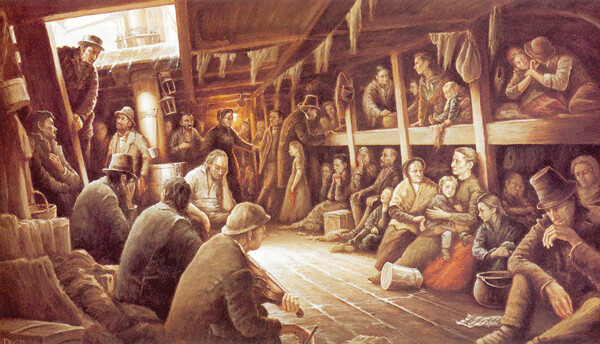News & Articles
Browse all content by date.

There’s a new novel out about the 19th Century Great Potato Famine when Ireland lost one million of its population of eight million to starvation and disease, and two million to emigration to other countries, including many thousands to the United States. Ireland still has a smaller population than it had before the famine. Domesticated in Peru and Bolivia over 7,000 years ago, the potato became the sole subsistence food for one-third of Ireland. Even the poor soil of Ireland grew potatoes, so the peasants were soon consuming 40 to 60 potatoes every day and one third of the harvest was used to feed livestock. A potato blight called US-1 started in Mexico and the United States and spread to Europe and Ireland in 1845, wiping out about one-half of Ireland’s crop. British landlords then evicted thousands of starving Irish peasants from their rented lands. No wonder the Irish still hate the English!
The author of “Grace” brings the famine to life through Grace and Colly, two teenagers who are driven from home by the famine. As they work their way across Ireland they discover Ireland has become a land of discouraged zombies. A man who is forced to live the life of a burglar tells Grace during their battle to survive: “Don’t you see what is going on around you? The have-it-alls and the well-to-doers who don’t give a damn what is happening to the ordinary people…This is the way of things now. It could be the end of the world for the likes of us, but to the likes of them, they aren’t bothered.”
Famine In The Land of Too-Much And Have-It-Alls In the 21St Century
Facebook CEO Mark Zuckerberg, now worth $68.5 billion, lives in a five-house estate in Palo Alto, California, and is now traveling the U.S. talking to people to “learn about people’s hopes and challenges” in a world of absolutely staggering income inequality his billions represent. He wants to know what to do with all his money. Two of his employees who live in their parent’s two-car garage with three children ages nine, eight, and four just a few miles from Zuckerberg’s estate are hoping that he stops to talk with them about their “hopes and challenges.”
Both Victor and Nicole work in a Facebook cafeteria making salaries that would be adequate in some cities. Nicole makes $19.85 an hour as a shift supervisor and Victor $17.85, but that is not enough to pay rent for even a one-bedroom apartment in an area “gentrified” by Silicon Valley billionaires. They earn too much to qualify for state health care insurance—and they can’t afford the health insurance plan offered by Zuckerberg. They even struggle to pay for basic foods and clothes for the family. Victor often has to take out payday loans and has had to borrow from a friend to pay for dental work.
The two serve “techies” and software engineers in the cafeteria who make four times what they make. Every day they listen to complaints about “trying to make ends meet” from them. Nicole says: “They look at us like we’re lower, like we don’t matter. We don’t live the dream. The techies are living the dream. It’s for them.” Remember what the burglar told Grace in 1845: “But to the likes of them, they aren’t bothered.”
From Feudalism—To Democracy—And Back To Feudalism
The feudal system of government came about in France in the 8th Century when a number of weak kings had to buy loyalty from nobles. They bought loyalty with land. When the Duke of Normandy conquered England in 1066 he confiscated all lands and then distributed them to about 200 elite barons and nobles who had supported his invasion. Each elite kept between 200 to 350 knights to defend his land and possessions, along with the help of about 10,000 peasants living as “sharecroppers” and renters on their land. Peasants could not freely move from one elite owner to another. Knights were often given land and supervision of peasants to maintain their loyalty. Huge castles and Downton Abbey-like homes were the courthouses of the “counties” owned by the elites of the century. This system lasted until revolutions in England, Europe, and America destroyed the remnants of feudalism and brought some aspects of democracy to government. The absolute authority of kings was finally challenged and defeated.
The United States, because of income inequality, is entering a period of feudalism similar to the Dark Ages. The bottom 80% can no longer afford to live in or close to many cities. The top 20% have to spend more for security as desperate people succumb to drug addiction and theft to support a habit. San Francisco, Santa Fe, Aspen, Naples, Seattle, Palm Beach, and many other cities have great difficulty hiring teachers and other service workers. Some teachers are in the $100,000 salary bracket but they can’t afford housing in some cities and refuse to use long commutes. San Francisco, as an example, is considering building subsidized housing so they can maintain teaching staffs for its public schools. The average home price in San Francisco is $2 million. In Palo Alto where Zuckerberg lives it’s $2.5 million.
Just Who Are Kings, Barons, Knights And Peasants Now?
The Best Congress Money Can Buy has been bought since a Republican Supreme Court decided the Citizens United case that money equals “free” speech, thus unleashing a tsunami of political campaign money. One man-one vote has allowed the Koch brothers, the Walton family, Wall Street bankers, and big business CEOs to buy millions of votes in an unregulated political market. The One Percent is the new king in our feudal system. The Congress represents barons and elites, getting money and largesse for their loyalty. The knights are our “volunteer” military coming from the poorest counties. They are seeking a way out of peasant land.
British philosopher Richard Reeves writes that the income gap is creating an American class system that “is functioning more ruthlessly than the British one I escaped.” Reeves admits that some of the top 20% have risen because of talent and hard work but also says they were born to parents able to “devote time, money, and influence to develop and nurture their talents and ensure their success.” The barons and the elites are causing an opportunity gap. There is definitely an income gap. Between 1980 and 2014 the average real income of the Mega Rich, the top .01%, has gone up 381%, doubling their income in that period, while the bottom 90% suffered a 3% decline. In 2014 the Mega Rich averaged $6.1 million in increased income. Leading Nobel Laureate economists estimate that income inequality in the United States hinders economic growth by .3% in any one year.
What Should A Nation Do To Make Some Progress Against Inequality?
We have over 47 million people living under the poverty level of $24,600 for a family of four. We have millions of Americans earning the federal minimum wage of $7.25 an hour, or $15,080 for 40 hours. There are only 12 counties in the nation where a worker making the minimum wage can afford to rent a one-bedroom apartment. The ten states with the lowest welfare support by rank order are Louisiana, Wyoming, Texas, Georgia, Oklahoma, Arkansas, Idaho, Arizona, North Carolina, and Indiana in that order. Notice that the ten are dominated by Republicans.
Economists have determined that progress against inequality depends on how much is spent on education, health, and public service. But in the U.S. the health care and drug industry has becomes so powerful we spend twice as much per individual on health care as any other developed country but provide lousy care for the poor and lower middle class and still leave about 30 million with no health insurance. The partial cure? Taxing the rich and corporations so a strong commitment can be made to education, health, housing, and food security by all levels of government. The U.S. now ranks 21st among developed nations in the Reducing Inequality Index of Oxfam and the UN, falling behind such nations as Sweden, Iceland, Ireland, Canada, Italy, and Slovenia.
According to a study of 55 of 61 economic studies of eight countries by the London School of Economics, researchers found that “money has a significant impact on everything from children’s cognitive and educational outcomes to their social development and physical health.”
The Smell Of Feudalism Permeates The Rural-Urban Divide In The U.S.
With democracy on the ropes in the U.S. due to billions of excess dollars in politics, gerrymandering by state legislatures, the nightly tweeter musings of a pseudo-billionaire psychopathic ignoramus, and the destructive influence of income and social inequality, there is the smell of anarchy and feudalism in our air.
A Washington Post-Kaiser Family Foundation poll indicates a real estrangement between rural and urban citizens. Nearly seven in ten rural residents say their values differ greatly from urban residents, with four out of ten saying their values are very different. In the last presidential election Hillary Clinton was favored by 32 points in urban counties while King Donald was favored by a 26-point margin in rural counties. Over two-thirds of rural residents rate job opportunities as very poor compared with one-half of urban residents. Poverty is about even in urban and rural America with rural poverty at 17% and urban poverty at 16%. About one in five adults in both rural and urban areas said there was a time last year when they couldn’t pay their bills.
Nearly 60% in rural areas say that Christian values are under attack compared with 50% of suburbanites and about 40% of urban residents. Remember that King Donald got 81% of the white evangelical vote, which is primarily a rural vote. Eighty percent of rural residents are white while in just a few years whites will be a minority in the U.S.
Let’s Take A Look At A Guaranteed Universal Income Plan
In the past, technology developed by educational institutions and private interests created good paying manufacturing and white collar jobs. Our economy tells us this is not happening today. Only nursing of the ten fastest-growing occupations today pays over $33,000 a year. Practically all of the better-paying middle class jobs have been outsourced to low-wage countries. General Electric’s CEO Jack Welch wanted to put all of GE’s factories on barges that could be towed to low-wage countries. In a sense it has happened. In a feudal system peasants and laborers cannot even afford to leave their elites for other jobs. That’s becoming true in the U.S.
Instead of creating another huge feudal estate dictated by the Mega Rich, we need to guarantee that every American family receives a living income as compensation for the productivity and great wealth earned by new technologies often funded by our tax dollars. Our educational institutions must be adequately funded in order to create new well-paying jobs in new industries. Until we can do that for the common good, we must assure that some form of guaranteed income is an absolute necessity for all families.
| Tweet |


